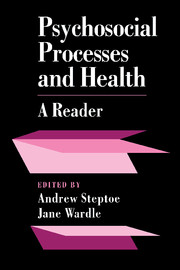Book contents
- Frontmatter
- Contents
- Preface
- Section 1 Life stress, social support and health
- Unemployment and mortality in the OPCS Longitudinal Study
- Job strain, work place social support, and cardiovascular disease: a cross-sectional study of a random sample of the Swedish working population
- Social networks, host resistance, and mortality: a nine-year follow-up study of Alameda County residents
- Goal frustration and life events in the aetiology of painful gastrointestinal disorder 68
- Psychosocial assets, life crisis and the prognosis of pregnancy
- Section 2 Psychophysiological processes in disease
- Section 3 Personality, behaviour patterns and health
- Section 4 Health practices and the modification of health risk behaviour
- Section 5 Coping with illness and disability
- Section 6 Behavioural interventions in medicine
- Index
Psychosocial assets, life crisis and the prognosis of pregnancy
from Section 1 - Life stress, social support and health
Published online by Cambridge University Press: 05 August 2016
- Frontmatter
- Contents
- Preface
- Section 1 Life stress, social support and health
- Unemployment and mortality in the OPCS Longitudinal Study
- Job strain, work place social support, and cardiovascular disease: a cross-sectional study of a random sample of the Swedish working population
- Social networks, host resistance, and mortality: a nine-year follow-up study of Alameda County residents
- Goal frustration and life events in the aetiology of painful gastrointestinal disorder 68
- Psychosocial assets, life crisis and the prognosis of pregnancy
- Section 2 Psychophysiological processes in disease
- Section 3 Personality, behaviour patterns and health
- Section 4 Health practices and the modification of health risk behaviour
- Section 5 Coping with illness and disability
- Section 6 Behavioural interventions in medicine
- Index
Summary
Abstract
Nuckolls, K. B. (Yale University School of Nursing, New Haven, Conn. 06510), J. Cassel and B. H. Kaplan. Psychological assets, life crisis and the prognosis of pregnancy. Am J Epidemiol95: 431-441, 1972.—This is a study of the relationships between psychosocial assets, social stresses as measured by a cumulative life change score and the prognosis of pregnancy. Psychosocial assets were measured early in pregnancy by a questionnaire (TAPPS) designed to assess the adaptive potential for pregnancy. At 32 weeks, subjects completed the Schedule of Recent Experience from which scores were calculated for life change during pregnancy and for the two years preceding it. Following delivery, the medical record was used to score each pregnancy as “normal” or “complicated.” Complete data were obtained on 170 subjects. Taken alone, neither life change nor TAPPS scores were significantly related to complications. However, when these variables were considered conjointly, it was found that if the life change score was high both before and during pregnancy, women with high TAPPS scores (favorable psychosocial assets) had only one third the complication rate of women with low TAPPS scores. In the absence of high cumulative life change, there was no significant relationship between psychosocial assets and complications.
adaptation, psychological; pregnancy; pregnancy complications; psychosomatic medicine; social adjustment; stress
Attempts to document the role of psychosocial factors in the genesis of human disease and, in particular, in the disorders of pregnancy have yielded intriguing but often confusing or conflicting results. Despite the plethora of anecdotal and case study reports, the findings of carefully conducted epidemiologic or clinical investigations have tended to be ambiguous. This is in sharp contrast to the dramatic results which have been obtained with animal experiments (1-10). To some extent, this may be due to the methodological difficulties inherent in such studies, but to a larger extent it is probably a function of inadequacies in the current theoretical framework. A recent review of some of these theoretical issues (11) has identified one of the central problems to be the nature of the model of causation subscribed to (often implicitly) by the majority of such investigators. Conditioned by the model provided by the germ theory, we have become accustomed to thinking in mono-etiologic terms.
- Type
- Chapter
- Information
- Psychosocial Processes and HealthA Reader, pp. 82 - 98Publisher: Cambridge University PressPrint publication year: 1994



